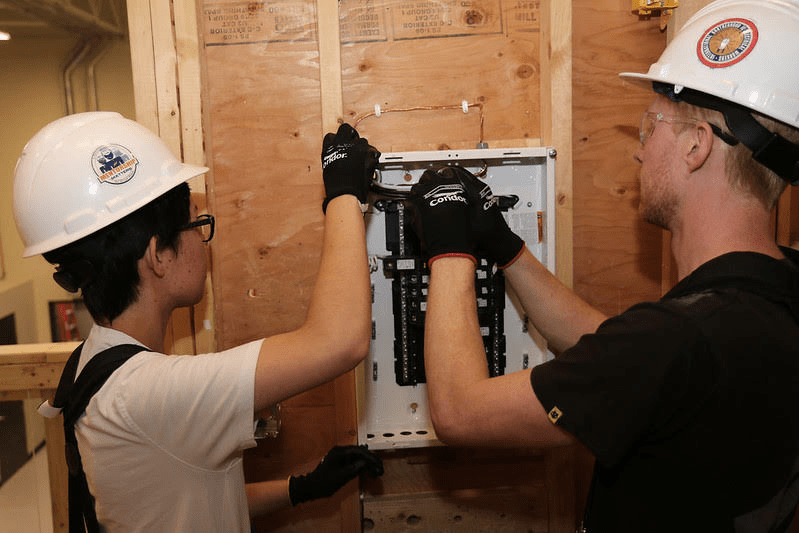Q&A: Trades trainer details immigrant experience
Immigration is set to play a major part in helping fill construction’s labour gaps. Are these newcomers being supported?

Trades students test their skills. – Province of B.C.
When electrical engineer Supneet Chawla arrived in Canada from India, she had to start from scratch and there was nobody to help guide her. When she saw other immigrants struggling, she began ACE Community College in her mother’s garage.
Over 17 years later the Surrey, B.C. school has helped more than 10,000 students, mostly immigrants like Chawla, get trades training and pass their red seal exams. She believes that the right training and the right connections is key to helping immigrants get high paying trades careers.
SiteNews chatted with Chawla to get her thoughts on the challenges immigrant works face and how they can be brought into the construction sector.
What role can new Canadians play in filling trades roles?
Chawla:“A lot of immigrants come with very big dreams. They have often left high paying jobs for a better life here. They will try to get their basic expenses paid and that’s when they knock on doors at retail stores, gas stations and they will try to get those jobs rather than looking for a career. Imagine a person with a family to support. They want to pay their rent. And that person gets sucked into a regular paying job and away from their real career. They have the skills but their dreams get crushed very quickly.”
What challenges do new Canadians face when they come to Canada?
Chawla: “The biggest thing I see for people is language. It’s a big factor. For me, 25 years ago, there was no internet and no cell phones when I landed. Research wasn’t as easily available as it is now. For immigrants now the number one challenge is language. They also come with responsibilities that they have to deliver on. And they also don’t come with a lot of money and it is so expensive these days. A one bedroom basement suite can be $1,500 and if you have kids you need a two bedroom basement suite. The living expenses are so high, that they have to start a job doing whatever they can get.”
What challenges do new Canadians face when trying to enter the trades?
Chawla: “The biggest challenge for a lot of people is the time commitment, the money commitment and the language commitment. Coming up with money for a $1,000 to $2,000 program. They don’t have that much money but the government has a lot of grants available. They just have to come to the campus so we can help them with those avenues of money that are available to a new immigrant. For language, the Industry Training Authority (ITA) allows you to bring a translator to exams or training. That comes in handy. For all our programs, people can bring their wife or child or anybody who speaks both languages comfortably to help them understand the content. Now when it comes to time they have to work that out for themselves. They can’t get sucked up into the nine-to-five job. They have to have a bigger vision. Commitment of time is the biggest. The other two we can help them get there. But they have to commit the time and show up at the campus.
What do you want employers to know about immigrants
Chawla:“Do not underestimate them just because they came from another country. Give them a chance and test the waters for a week. But do not underpay them just because they are an immigrant. This person may be an immigrant now, but in ten years they may feel that they weren’t treated fairly at their first job. Give them a good first experience of being in a good environment, pay them a fair salary. Make sure they have all the resources to do the job and give them an opportunity.
Do immigrants often get paid less than others?
Chawla: I feel that as an immigrant you are desperate and an employer sees that. I’m an employer myself and whenever I meet potential new employees, what is most important is what they want. Of course I want good work, but what do they want? If I can deliver to your needs, you will deliver for my needs. Any relationship, no matter if it is business or family, it has to be a win-win. That is the only way it works. If I can’t deliver as an employer, how are you going to deliver as an employee? So it’s really important you pay a decent salary so they can do a decent job, give them decent working conditions and not undermine them because they are an immigrant and they were desperate for a job.
What impact do trades careers have on your clients’ lives?
Chawla: The way I see it, when immigrants come to this country they are like a seed and they want to become a plant. If the seed is healthy, the plant will flourish. I see myself inputting into their lives so the seed can be sown in the right spot so their lives are flourishing. If you have a poor beginning, chances are that your end will be bad as well. Training brings that value to them. As an immigrant, that is where I take my pride. And as a college owner this is something very important to my heart. I sleep well at night thinking about the people we have helped get to a career given the tools and techniques to flourish.
What does it mean to you to be woman of colour and immigrant in the trades?
Chawla: “For me it is a satisfaction as a woman. I take so much pride in where I am today. And it didn’t come easy. There were no long weekends. In 17 years I’ve never had a Saturday because I’m always teaching Saturdays. It comes down to this satisfaction that I get from helping people in a way that I couldn’t get when I came here. I was lost when I came and I had nowhere to turn to figure this out. I had to go through so many hoops to get where I wanted. As a woman of colour, when I see these people doing so much better in life and having some input in that, it makes me feel really good. I would not have done anything differently. I love education and I believe that without education we are nobody. And that’s not just a degree, it’s being aware of what’s out there, what resources are available and what I can do to have a better life. That comes through education. Our mind thinks differently once we are educated.”

